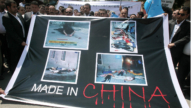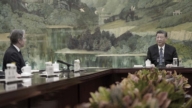【新唐人2015年02月02日讯】中共商务部最近公布了《外国投资法(草案征求意见稿)》,规定实际控制人的国籍决定企业是否为外资企业,而外资企业不得投资禁止实施目录列明的领域。专家指出,实际控股标准虚无缥缈,等同儿戏。
1月19号,中共商务部公布了《外国投资法(草案征求意见稿)》,试图取代实施了将近30年的外资三法,也就是外资企业法、中外合资经营企业法和中外合作经营企业法。
中国原来的法律对外资企业的认定标准,是根据股东的国籍来认定企业的国籍。
新的外国投资法草案,对外国投资者的定义中采取“实际控制”标准,也就是说,实际控制人的国籍决定企业是否为外资企业,继而认定是否为外国投资者。
草案第11条第2款规定:受外国投资者控制的境内企业,视同外国投资者。第18条规定:认定控制某一企业的标准,除了具有股权、董事会股东会控制权外,也包括通过协议或信托方式对该企业的经营、财务、人事或技术等施加决定性影响。
中国资深法学专家赵远明:“实际控制权实际上在法律上是虚无缥缈的,日常经营靠总经理,靠CEO。开一个董事会,董事长能给他踢跑了,你说谁控制,换一个中国国籍的就是中资企业了,那你这企业一年能够变好几次,小孩的游戏似的。”
外国投资法草案出来后,由于涉及对外资监管法律体系的变革,引起了中外企业的关注。外界普遍认为互联网企业将受到较大冲击。
在过去的十几年中,中国民营企业为了在海外上市融资,同时规避中共当局在互联网、电信和教育等政治敏感行业对外商投资的限制,采取了一种叫做VIE的可变利益实体模式。
VIE结构,通常是指境外特殊目的公司,通过它在中国的全资子公司,以协议控制的方式控制一家内资公司,从而实现境外特殊目的公司对内资公司的并表,然后境外特殊目的公司再在境外融资或上市。
2000年,新浪作为第一个使用VIE模式的公司,成功实现美国上市后,搜狐、百度、包括阿里巴巴,以及传媒、教育、消费、广电类的企业也纷纷采纳这一模式。据不完全统计,从2000年至去年6月,通过VIE模式实现境外上市的内资企业约有250家。
到目前为止,中共当局对VIE结构基本都是睁一眼闭一眼,因而VIE结构一直被称为灰色地带。
美国《中国事务》总编辑伍凡:“最大的原因引起这个改变的,就是以阿里巴巴为代表的网路公司到外国去投资,引起外国有兴趣,它要投入进来,网路在中国又是一个非常忌讳的一个行业,网路里面很多内容不准你外国人投资的,所以这里面就产生了很大的冲突。”
不过,新的外国投资法草案规定,外国投资者不准投资禁止实施目录列明的领域。
大陆《新浪网》评论说,虽然现行法律并未禁止VIE,但VIE的合法性,对于实现境外上市的内资企业来说,依然是头上的一把利剑。
北京东易律师事务所郭立军律师对媒体表示,如果VIE模式被政府认为违法,采用VIE模式的内资企业,将会被认定为不具备按内资企业申请各种牌照的资格。同时会使得企业面临非法经营的法律风险。如果协议出现问题,海外上市的壳公司就会一文不值。
《华尔街日报》报导说,10多年来,VIE结构的法外身份让很多外国投资者担心,他们害怕一旦北京开始管束这种企业结构,或在中国境内的经营实体决定不再履行与境外控股公司间的合约,外商的利益可能就得不到保护。
投资专家认为,每当有关对VIE的某种担忧出现时,很多在纽约上市的中国企业股价就会受挫。如果中国法律将VIE结构,重新认定为外国投资者对华投资的合法途径,进行此类投资的难度就会小很多。
采访编辑/刘惠 后制/李智远
Is The Foreign Investment Draft Legislation a Child’s Game?
The Chinese Communist Party (CCP) Ministry of Commerce
issued draft legislation on “Foreign Investment (Draft for
Comment, the Draft)" for public comment. It focuses on
who has control of the company.
The ‘control’ of the company determines
if the company is foreign.
Foreign companies are barred from operating
in restricted sectors.
Experts criticize that the standard of ‘control’
is like children playing.
The Draft from Ministry of Commerce is to replace
the current three foreign investment laws:
Law on Wholly Foreign-owned Enterprises;
Law on Sino-foreign Equity Joint Ventures; and,
Law on Sino-foreign Cooperative Joint Ventures.
The current laws deems business as foreign
based on its foreign shareholders.
The Draft, however, focuses on who has the actual control
of the company.
The nationality of the controller determines if the company
is a foreign business or a foreign investment.
Draft article 11, paragraph states “Domestic business
controlled by foreign investors is a foreign investment".
Draft article 18 states, “The definition of ‘control’ is the
equity shareholder, board of directors, and influential
decisionmakers through agreement or trust on the
corporate management, finance, personnel, or technologies.
Chinese legal expert Zhao Yuanming: “The actual control
Is an illusion in law.
Daily operations are done by the General Manager, the CEO.
But they can be kicked out in one meeting by the Chairman
of the board. So, who’s controlling?
One Chinese manager will make it into a Chinese owned
business. It can be changed multiple times a year.
It’s like a child’s game."
The Draft has caused concerns as it could bring changes
to the way the CCP regulates foreign investment.
The internet business, in particular, is expected
to be extremely heavily hit.
For more than a decade, Chinese businesses have adopted
the variable interest entity (VIE), to allow foreign investment
in sensitive industries such as the Internet, education and
telecommunication that typically forbid foreign investment.
The VIE structure lets investors take stakes in offshore
holding companies that rely on contracts to control—
but not own—the Chinese entities that actually operate
the businesses, said the Wall Street Journal.
In 2000, Sina became the first company to use the VIE
structure and show up in the US market, followed by
Alibaba and media, education, commodity, and
entertainment industries.
Data showed that up to June last year, there were 250
companies which successfully adopted the VIE structure.
Until now, the Chinese government has largely turned
a blind eye to VIE’s, but some foreign investors worry
that their status remains unclear, added the WSJ.
Chinese Affairs magazine editor Chris Wu, “The reason for
this change is mainly because e-commerce giant, Alibaba,
invested overseas and attracted interested foreign investors.
But the internet is a very sensitive sector in China.
Foreigners are banned from participating.
That’s why conflict arises."
WSJ stated, it appears to say that VIEs will be deemed
to be foreign if foreign investors are in control,
meaning they may be barred from operating in
restricted sectors.
Sina commented that current laws did not ban the VIE.
However, the legal issue of the VIE could be a sword
for foreign shareholders of Chinese companies.
Beijing lawyer Guo Lijun told the media that if the CCP
considers the VIE illegal, Chinese companies with foreign
shareholders will have their registration revoked and
face the issue of illegal operations.
Should the negotiation fail, the overseas entity
will become worthless.
The VIE legal status has been unclear for foreign investors
for more than ten years.
It has been reported that Investors feel the lack of clarity on
the legalities mean they may not be protected if the CCP
changes the structure or if Chinese companies don’t agree
with being bound to the offshore holding companies.
Finance experts analyze that many Chinese businesses listed
on the NYSE trade at below market value in response to any
fears related to the status of the VIE structure.
Foreign investors will have a much easier time investing in
Chinese businesses if the CCP allows the VIE structure to
become legitimately recognized in Chinese law.
Interview & Edit/LiuHui Post-Production/Li Zhiyuan





























